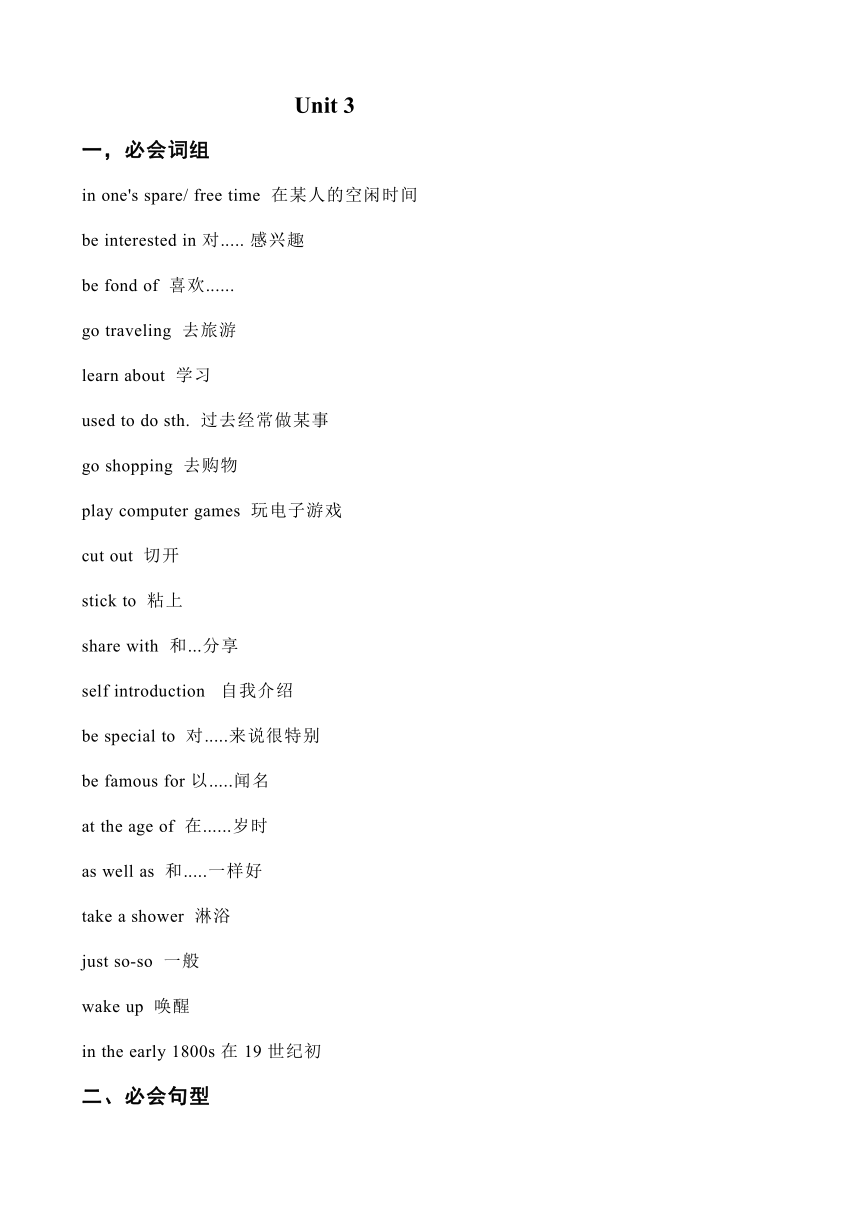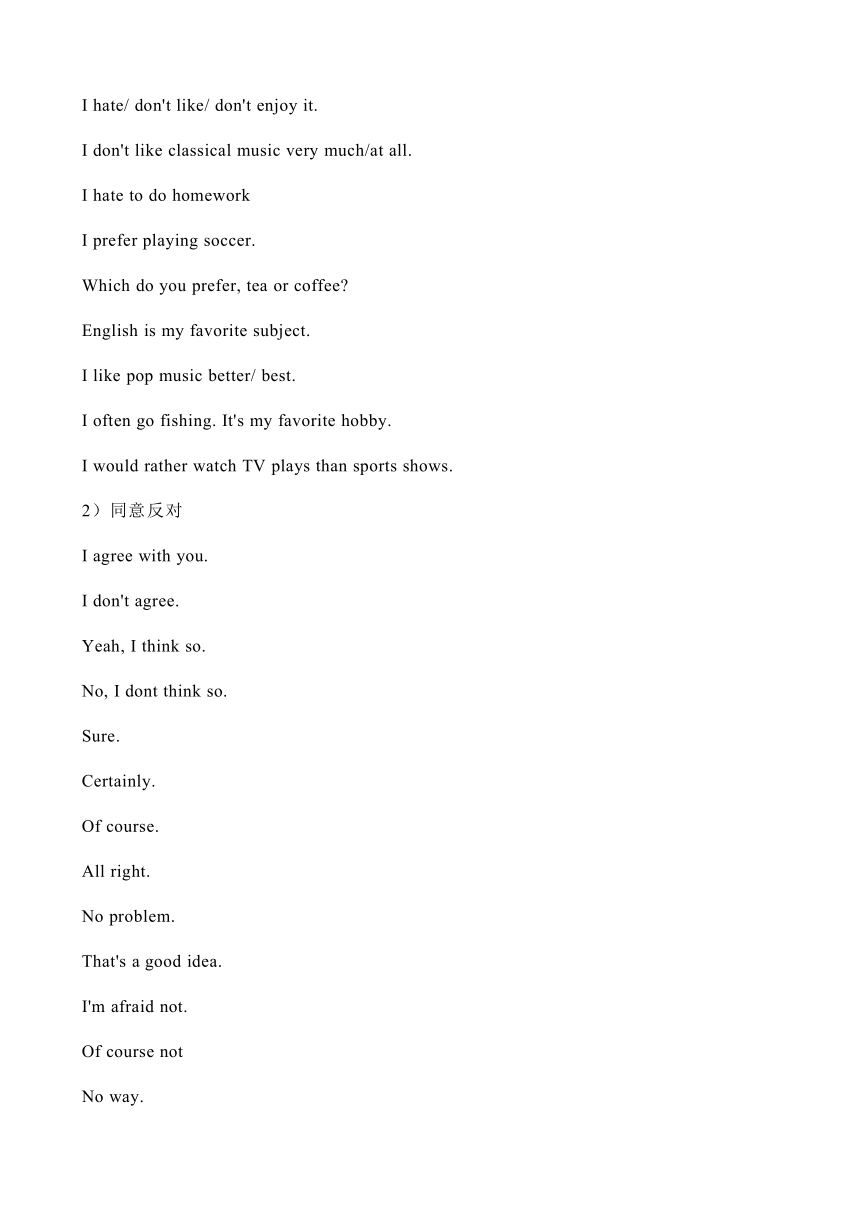Unit 3 Our Hobbies必会词组汇总&同义词(组)辨析
文档属性
| 名称 | Unit 3 Our Hobbies必会词组汇总&同义词(组)辨析 |

|
|
| 格式 | docx | ||
| 文件大小 | 25.4KB | ||
| 资源类型 | 教案 | ||
| 版本资源 | 仁爱科普版 | ||
| 科目 | 英语 | ||
| 更新时间 | 2023-12-17 00:00:00 | ||
图片预览



文档简介
Unit 3
一,必会词组
in one's spare/ free time 在某人的空闲时间
be interested in 对..... 感兴趣
be fond of 喜欢......
go traveling 去旅游
learn about 学习
used to do sth. 过去经常做某事
go shopping 去购物
play computer games 玩电子游戏
cut out 切开
stick to 粘上
share with 和...分享
self introduction 自我介绍
be special to 对.....来说很特别
be famous for 以.....闻名
at the age of 在......岁时
as well as 和.....一样好
take a shower 淋浴
just so-so 一般
wake up 唤醒
in the early 1800s 在19世纪初
二、必会句型
1. What's your hobby
2. -Why not go out and do some outdoor activities -Sounds good !
3. I like/ love /enjoy/ prefer/ am interested in /am fond of dancing.
4. It must be great fun.
5. -What hobbies did you use to have -I used to collect baseball cards.
6. He doesn't mind whether they are good or not.
7. He is very special to me.
8. It's hard to say.
9. At the age of three, he was able to play the piano by himself.
10. Here's a story about Mozart when he was a child.
11. Good music brings people comfort and peace in mind.
12. Hold the line , please.
13. What were you doing at this time yesterday
14. I think it was just so-so.
15. The mouse and the cat were chatting happily while they were enjoying the moon.
三、情景交际
1)爱好喜欢
I love/like singing and playing the guitar.
I enjoy dancing to music.
I'm interested in playing basketball.
I like/ love reciting poems.
I am fond of acting.
This song is bad/ awful.
I hate/ don't like/ don't enjoy it.
I don't like classical music very much/at all.
I hate to do homework
I prefer playing soccer.
Which do you prefer, tea or coffee
English is my favorite subject.
I like pop music better/ best.
I often go fishing. It's my favorite hobby.
I would rather watch TV plays than sports shows.
2)同意反对
I agree with you.
I don't agree.
Yeah, I think so.
No, I dont think so.
Sure.
Certainly.
Of course.
All right.
No problem.
That's a good idea.
I'm afraid not.
Of course not
No way.
三、同意词(组)辨析
1. go on doing sth. /go on to do sth. /go on with sth.
(1) After he finished his homework, he _____ a novel.
(2) After he had a rest, he _____ his work.
(3) He said nothing but just _____ the article.
[分析比较]
go on doing sth.表示不受任何影响仍然继续做原来的事情。(3)题意为“他什么也没说,只是继续读文章。”故填went on reading。
go on to do sth.表示做完某件事后紧接着又继续做另外件(不同的)事情。(1)题意为“他做完家庭作业后,紧接着看小说。”故填went on to read。
go on with sth.在做某事中间被打断后继续做被打断前做的事情。(2)题意为“休息一会儿后,他继续做他的工作。”故填went on with。
2.interesting/ interested
(1) What an _____ movie !
(2) I'm _____ in the news.
[分析比较]
intersting 指某物(事) “有趣的,有吸引力的”。”(1)题意为“多么有趣的电影!”指电影有趣。故填interesting。
interested 指人"对.....感兴趣”,后常跟介词in。(2)题意为“我对这新闻感兴趣”,表示“某人对....感兴趣”。故填interested。
后缀-ing和-ed的形容词原则上是:后缀-ing 的形容词多用来描述事物; 后缀-ed的形容词多用来描述人。如:
tiring引起疲劳的,tired(人)感到疲劳的
exciting令人激动的,excited (人)感到激动的,兴奋的
surprising令人惊讶的,surprised (人)感到惊讶的
boring无聊的,bored(人)感到无聊的
3. too ... to ... /enough to ... /so... that…
(1)The child is _____ young _____ go to school.
(2)The boy is not tall _____ reach the apples on the tree.
(3)The girl is _____ young _____ she can't draw a picture.
[分析比较]
too... to... 意为“太....而不能....表示否定意义,其结构为too+adj. /adv. +to+v. (1)题意为“这个孩子太小了,不到上学的年龄。”故填too... to...
enough to do...意为“足够.....做....”,to后跟动词原形。(2)题意为“那个男孩不够高,够不着树上的苹果。”故填enough to
so ... that ...意为“如....以至于......”,其结构为so+adj. /adv. +that+从句, 引导一个结果状语从句。(3)题意为“那女孩太小了,画不了画。”此句为结果状语从句。故填so ...that ...
[链接]
① so... that... 引导结果状语从句。如:
The boy is so angry that he can't say anything. 这个男孩如此生气,以至于说不出话来。
② so that意为“为了”,表示目的,引导目的状语从句。如:The students study hard so that they can make their dreams come true. 为了实现梦想,同学们努力学习。
4. please/ pleasant/ pleased/ pleasure
(1) Come in, _____.
(2) It gives me much _____ to be with you.
(3) Our English teacher is a very _____ young man.
(4) I'm very _____ to hear the news.
[分析比较]
please 动词,意为“使人高兴”。还可以作感叹词,意为“请",通常用于祈使句或表示请求、邀请的句子中,用于句末时前面通常用逗号隔开。(1)题意为“请进。”故填please。
pleasant形容词,意为“使人快乐的,令人满意的",用来说明人时表示“使别人愉快或招人喜欢”。(3)题意为“我们的英语老师是位招人喜欢的年轻人。”故填pleasant。
pleased形容词,意为“感到高兴或满意”,be pleased之后可接介词with, about, at或不定式和从句。(4)题意为“我很高兴听到这个消息。”故填pleased。
pleasure名词,意为愉快;高兴;使人愉快的事物”。(2)题意为“跟你在一起我很高兴。” 故填pleasure。
5. quickly/ fast/ soon
(1) Don't drive so _____.
(2) They'll be home _____.
(3) I can't run _____ than my brother.
(4) I _____ realized that I was on the wrong train.
(5) She sold the house _____ after her husband died.
[分析比较]
quickly 迅速地,很快地。强调动作迅速、敏捷,而不是强调运动本身的速度。(4)题意为“我很快意识到我坐错了火车。”表示反应很快。故填quickly。
fast快速、快。强调动作、速度迅速,侧重指运动的物体。(1)题意为“别把车开得这么快。”故(1)填fast,(3)题意为“我没有我哥哥跑得快。”都表示速度快。故(3)填faster。
soon很快,马上,不久。强调时间快。(2)题意为“他们很快就要到家。”(5)题意为“丈夫去世后不久,她就把房子卖了。”都表示“不久,很快”。故(2)和(5)都填soon。
一,必会词组
in one's spare/ free time 在某人的空闲时间
be interested in 对..... 感兴趣
be fond of 喜欢......
go traveling 去旅游
learn about 学习
used to do sth. 过去经常做某事
go shopping 去购物
play computer games 玩电子游戏
cut out 切开
stick to 粘上
share with 和...分享
self introduction 自我介绍
be special to 对.....来说很特别
be famous for 以.....闻名
at the age of 在......岁时
as well as 和.....一样好
take a shower 淋浴
just so-so 一般
wake up 唤醒
in the early 1800s 在19世纪初
二、必会句型
1. What's your hobby
2. -Why not go out and do some outdoor activities -Sounds good !
3. I like/ love /enjoy/ prefer/ am interested in /am fond of dancing.
4. It must be great fun.
5. -What hobbies did you use to have -I used to collect baseball cards.
6. He doesn't mind whether they are good or not.
7. He is very special to me.
8. It's hard to say.
9. At the age of three, he was able to play the piano by himself.
10. Here's a story about Mozart when he was a child.
11. Good music brings people comfort and peace in mind.
12. Hold the line , please.
13. What were you doing at this time yesterday
14. I think it was just so-so.
15. The mouse and the cat were chatting happily while they were enjoying the moon.
三、情景交际
1)爱好喜欢
I love/like singing and playing the guitar.
I enjoy dancing to music.
I'm interested in playing basketball.
I like/ love reciting poems.
I am fond of acting.
This song is bad/ awful.
I hate/ don't like/ don't enjoy it.
I don't like classical music very much/at all.
I hate to do homework
I prefer playing soccer.
Which do you prefer, tea or coffee
English is my favorite subject.
I like pop music better/ best.
I often go fishing. It's my favorite hobby.
I would rather watch TV plays than sports shows.
2)同意反对
I agree with you.
I don't agree.
Yeah, I think so.
No, I dont think so.
Sure.
Certainly.
Of course.
All right.
No problem.
That's a good idea.
I'm afraid not.
Of course not
No way.
三、同意词(组)辨析
1. go on doing sth. /go on to do sth. /go on with sth.
(1) After he finished his homework, he _____ a novel.
(2) After he had a rest, he _____ his work.
(3) He said nothing but just _____ the article.
[分析比较]
go on doing sth.表示不受任何影响仍然继续做原来的事情。(3)题意为“他什么也没说,只是继续读文章。”故填went on reading。
go on to do sth.表示做完某件事后紧接着又继续做另外件(不同的)事情。(1)题意为“他做完家庭作业后,紧接着看小说。”故填went on to read。
go on with sth.在做某事中间被打断后继续做被打断前做的事情。(2)题意为“休息一会儿后,他继续做他的工作。”故填went on with。
2.interesting/ interested
(1) What an _____ movie !
(2) I'm _____ in the news.
[分析比较]
intersting 指某物(事) “有趣的,有吸引力的”。”(1)题意为“多么有趣的电影!”指电影有趣。故填interesting。
interested 指人"对.....感兴趣”,后常跟介词in。(2)题意为“我对这新闻感兴趣”,表示“某人对....感兴趣”。故填interested。
后缀-ing和-ed的形容词原则上是:后缀-ing 的形容词多用来描述事物; 后缀-ed的形容词多用来描述人。如:
tiring引起疲劳的,tired(人)感到疲劳的
exciting令人激动的,excited (人)感到激动的,兴奋的
surprising令人惊讶的,surprised (人)感到惊讶的
boring无聊的,bored(人)感到无聊的
3. too ... to ... /enough to ... /so... that…
(1)The child is _____ young _____ go to school.
(2)The boy is not tall _____ reach the apples on the tree.
(3)The girl is _____ young _____ she can't draw a picture.
[分析比较]
too... to... 意为“太....而不能....表示否定意义,其结构为too+adj. /adv. +to+v. (1)题意为“这个孩子太小了,不到上学的年龄。”故填too... to...
enough to do...意为“足够.....做....”,to后跟动词原形。(2)题意为“那个男孩不够高,够不着树上的苹果。”故填enough to
so ... that ...意为“如....以至于......”,其结构为so+adj. /adv. +that+从句, 引导一个结果状语从句。(3)题意为“那女孩太小了,画不了画。”此句为结果状语从句。故填so ...that ...
[链接]
① so... that... 引导结果状语从句。如:
The boy is so angry that he can't say anything. 这个男孩如此生气,以至于说不出话来。
② so that意为“为了”,表示目的,引导目的状语从句。如:The students study hard so that they can make their dreams come true. 为了实现梦想,同学们努力学习。
4. please/ pleasant/ pleased/ pleasure
(1) Come in, _____.
(2) It gives me much _____ to be with you.
(3) Our English teacher is a very _____ young man.
(4) I'm very _____ to hear the news.
[分析比较]
please 动词,意为“使人高兴”。还可以作感叹词,意为“请",通常用于祈使句或表示请求、邀请的句子中,用于句末时前面通常用逗号隔开。(1)题意为“请进。”故填please。
pleasant形容词,意为“使人快乐的,令人满意的",用来说明人时表示“使别人愉快或招人喜欢”。(3)题意为“我们的英语老师是位招人喜欢的年轻人。”故填pleasant。
pleased形容词,意为“感到高兴或满意”,be pleased之后可接介词with, about, at或不定式和从句。(4)题意为“我很高兴听到这个消息。”故填pleased。
pleasure名词,意为愉快;高兴;使人愉快的事物”。(2)题意为“跟你在一起我很高兴。” 故填pleasure。
5. quickly/ fast/ soon
(1) Don't drive so _____.
(2) They'll be home _____.
(3) I can't run _____ than my brother.
(4) I _____ realized that I was on the wrong train.
(5) She sold the house _____ after her husband died.
[分析比较]
quickly 迅速地,很快地。强调动作迅速、敏捷,而不是强调运动本身的速度。(4)题意为“我很快意识到我坐错了火车。”表示反应很快。故填quickly。
fast快速、快。强调动作、速度迅速,侧重指运动的物体。(1)题意为“别把车开得这么快。”故(1)填fast,(3)题意为“我没有我哥哥跑得快。”都表示速度快。故(3)填faster。
soon很快,马上,不久。强调时间快。(2)题意为“他们很快就要到家。”(5)题意为“丈夫去世后不久,她就把房子卖了。”都表示“不久,很快”。故(2)和(5)都填soon。
同课章节目录
- Unit 1 Playing Sports
- Topic 1 I'm going to play basketball.
- Topic 2 I'll kick you the ball again.
- Topic 3 The school sports meet is coming.
- Unit 2 Keeping Healthy
- Topic 1 You should brush your teeth twice a day.
- Topic 2 I must ask him to give up smoking.
- Topic 3 Must we exercise to prevent the flu?
- Unit 3 Our Hobbies
- Topic 1 What's your hobby?
- Topic 2 What sweet music!
- Topic 3 What were you doing at this time yesterday
- Unit 4 Our World
- Topic 1 What's the strongest animal on the farm?
- Topic 2 How can we protect ourselves from the eart
- Topic 3 The Internet makes the world smaller.
